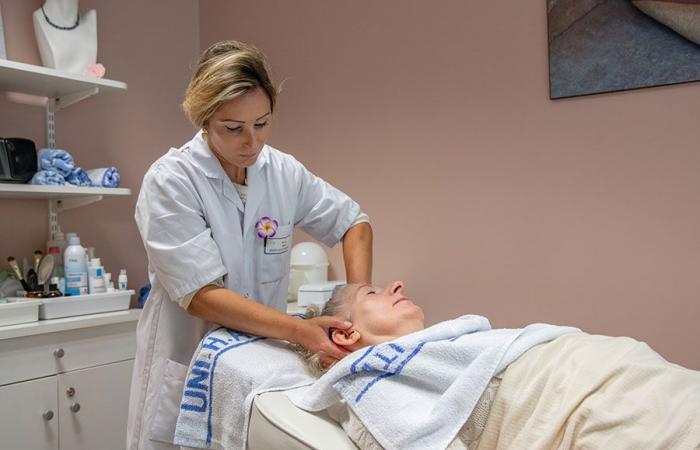Malorie Proust has been a socio-esthetician at Poitiers University Hospital for six years. His job, little known to the general public, consists of providing personalized support to patients, using aesthetic treatments as a vector of well-being and self-esteem. She chose oncology to practice her profession and bring comfort to patients.
A complementary profession
Socio-aesthetics differs from traditional aesthetics with an approach centered on support through care, listening and touch. It is an integral part of supportive care. Malorie intervenes at the request of the patient himself, or at the request of the teams, in the various departments of the regional cancer center. The care provided is adapted to patients and their pathologies, with the aim of improving their quality of life and well-being. Member of the multidisciplinary team, she works in collaboration with caregivers, supportive care (psychologists, dieticians, social workers, physiotherapists, etc.), and with Christelle Mamodaly, facilitator of the meeting and information area of the regional center of oncology, allowing comprehensive care.
Training with a vast and constantly evolving scope of action
After initial training in traditional aesthetics and several years of experience in this profession, Malorie followed a year of specialization at the CODES of the CHRU of TOURS, in order to obtain the title of socio-esthetician. This training allows you to acquire in-depth medical and medico-social knowledge.
The scope of action of the socio-esthetician is vast. At Poitiers University Hospital, Malorie works in oncology but there are multiple possibilities for practice: in geriatrics to work on poly-sensory and/or reminiscence, in Alzheimer’s units, in pediatrics, particularly in medical-educational institutes, or even in a prison environment. The treatments offered are varied and adapted to the needs of each patient, depending on the pathology and treatments: massages to alleviate physical and/or psychological pain, cosmetic advice for the side effects of treatments, makeup to highlight facial features or make up a missing eyebrow. The objective is to restore the patient’s confidence by allowing him to regain a positive self-image.
Challenges and future prospects
The profession of socio-esthetician is demanding both emotionally and technically. It requires good listening skills, empathy, mastery of care and above all constant adaptation. Medical advances and the emergence of new pathologies require constant monitoring. Malorie underlines the importance of working in a multidisciplinary team, because the team’s view of the patient is essential in order to be able to detect appropriate socio-aesthetic care, detecting a need for information or care.
Supportive care is often overlooked and yet essential. Socio-aesthetics is a rapidly developing field that offers many future prospects. By supporting patients in their care journey, she contributes to improving the quality of hospitalization and the well-being of the person being treated in order to regain pleasant sensations in their body.
Malorie emphasizes that it is an experience rich in learning, through the life stories of women and men, who pass through her fingers and who, for a moment, forget a little about their illness, their suffering.
Share the publication “Malorie Proust, socio-esthetician: a profession at the heart of care”






